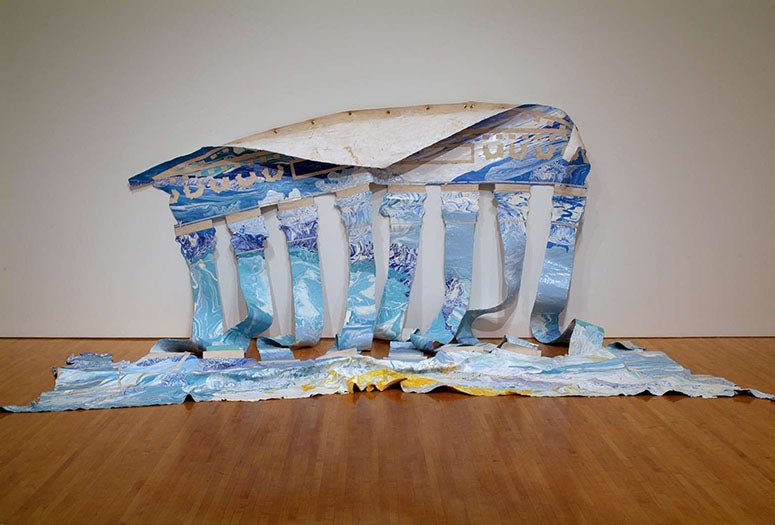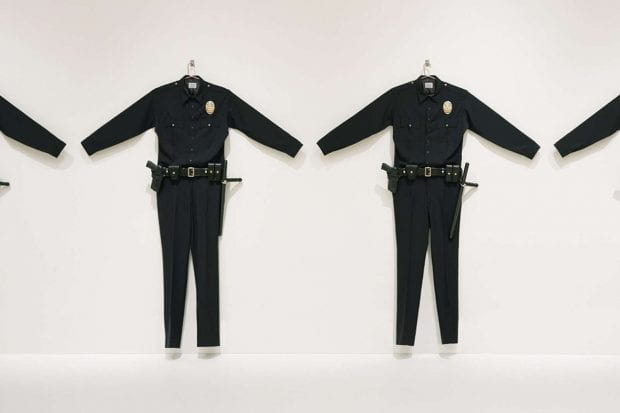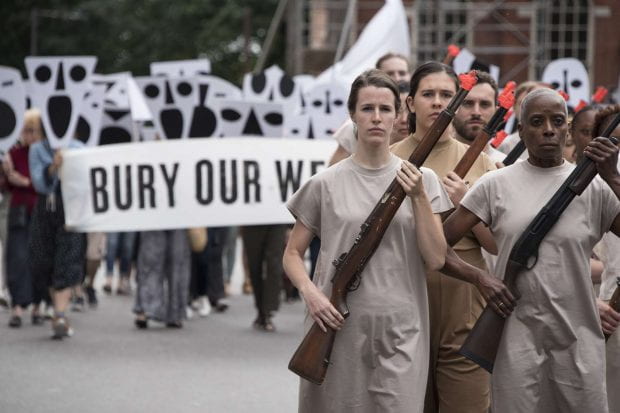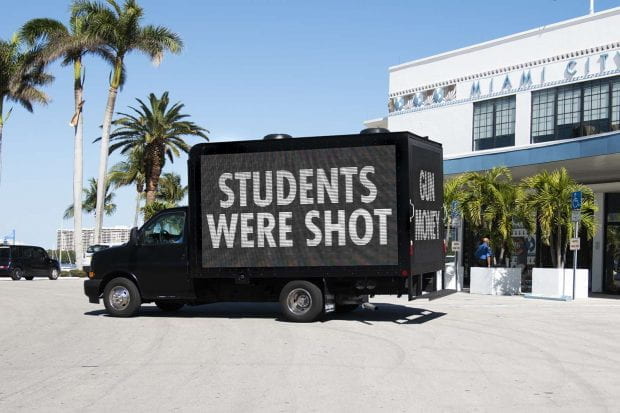Rice University's Moody Center for the Arts will reopen its galleries Sept. 18 with the fall exhibition “States of Mind: Art and American Democracy.” Reflecting on some of the most pressing topics facing American democracy, “States of Mind” is timed to coincide with the 2020 presidential election and encourage dialogue around current social and political issues.
“As the political process unfolds, the exhibition will underscore the fundamental role art plays in fostering a dynamic dialogue in the community, especially during this divided time,” said Alison Weaver, the Suzanne Deal Booth Executive Director of the Moody Center.
“States of Mind” will open over two, socially distanced evenings: Sept. 18 and 19, from 6–8 p.m. Music will be provided by DJ Sun outdoors on the patio both evenings. Houston Poet Laureate Leslie Contreras Schwartz will perform the poem-sound piece “anthemic,” composed in response to the exhibition, at 7 p.m. Sept. 18. Space is limited and registration is required.
Organized by associate curator Ylinka Barotto, “States of Mind” features emerging artists — some of whom, such as Janiva Ellis and Camilo Godoy, will be showing their work in Texas for the first time — together with established figures such as Cady Noland and Hank Willis Thomas. The fall exhibition will include paintings, sculptures, installations, videos and works on paper, all providing an intergenerational take on the U.S. democratic system.
Many of the works examine the status of our country’s founding principles of freedom and equality, while others engage with questions of voting access, gun control and immigration policies — three issues hotly debated throughout the U.S. that are of particular concern to Texas.
The works in “States of Mind” span the last three decades. Some were created in direct response to the current presidential administration, a period during which many of these issues have come front and center. Yet “States of Mind” will not attempt to cover the myriad complexities of a democratic government. Rather, it will invite viewers to consider timely yet recurrent questions around these themes.
Using the cube as a metaphor for democracy, exhibition designer and architect Aviva Rubin deconstructs the geometric shape to echo the exhibition’s theme of an imperfect system. Golden walls throughout the galleries will point to the aspiration of improving and perfecting government, even as many of the artworks expose frail social realities.
Highlights will include works questioning the state of long-standing democratic institutions. For example, Rodney McMillian’s “Untitled (The Supreme Court Painting)” -- created in reaction to the decisive role the Supreme Court played in the 2000 presidential election -- points to the collapse of American values, represented by the Supreme Court building seeming to melt into the ground.
Chris Burden’s “L.A.P.D. Uniforms,” created in response to the 1992 police beating of Rodney King and the subsequent Los Angeles riots, still resonates nearly three decades later. Imposing in scale, the uniforms reflect on the outsize power of the police force and its instances of repressive conduct.
Addressing issues of voting access, Aram Han Sifuentes will create a site-specific installation encouraging the public to think about voting as an inclusive act of civic participation. “Official Unofficial Voting Station: Voting for All Who Legally Can’t for the 2020 Presidential Election” consists of a booth where visitors can cast ballots that question the electoral system, who is excluded from it, and what would happen if those marginalized people were allowed to take part in the democratic process.
Gun control is central to Israeli artist Yael Bartana’s video “The Undertaker,” which is being presented in the U.S. for the first time, while Mexican artist Teresa Margolles’s “El Brillo” series consists of three elegantly hand-embroidered black-velvet garments adorned with glass shards from shootings at the Texas-Mexico border and from the artist’s hometown of Culiacán. Guadalupe Maravilla’s “Disease Thrower #9” is a personal account of the displacement, alienation and uncertainty the artist confronted as an undocumented child migrating to the U.S.
Two public interventions will also take “States of Mind” beyond the borders of the campus into the city of Houston. Over the course of two days during the exhibition’s opening, artist Jenny Holzer’s “IT IS GUNS” will travel throughout the Rice campus and the city of Houston with LED messages displayed on three sides of a box truck, encouraging viewers to take action against gun violence.
Catherine Opie’s “Political Collages” is a new body of work responding to current political and social uncertainties, with animated sequences of magazine images that will appear on freestanding vertical monitors across the Rice campus and in public locations around the city.
The fall 2020 Leslie and Brad Bucher Artist-in-Residence will be Coco Fusco, an interdisciplinary artist and writer whose work uses performance and video along with audience participation to address issues of gender, race, identity, politics and war. Given the restrictions of COVID-19, the residency will take place virtually, with Fusco remotely participating in a series of talks and classes through online platforms.
The Moody Center will also follow Centers for Disease Control and Prevention guidelines and Rice mandates in response to COVID-19. Visitors will be required to wear face coverings and maintain social distancing of six feet or more. Entry to the galleries will be limited to support social distancing.
All events will require RSVPs, which will be available through the Moody Center website. In addition to increased cleaning protocols, visitors can expect low-touch entry and exit points and a limited number of people in all public areas.
In addition to the opening receptions, the Moody Center will host additional concurrent programming throughout the season. A virtual conversation with artist Catherine Opie will take place Oct. 22 from 6–7 p.m. hosted by Alison Weaver.
Two outdoor movie nights on Dec. 4 and 5 at 7 p.m. will see “Election” and “The Candidate,” respectively, projected on the Moody Center’s west wall. Attendees are encouraged to bring their own blankets and popcorn for a socially distanced outdoor viewing experience. Space is limited and registration is required.
For additional information on upcoming events and the artists with works on view in “States of Mind,” visit moody.rice.edu.




